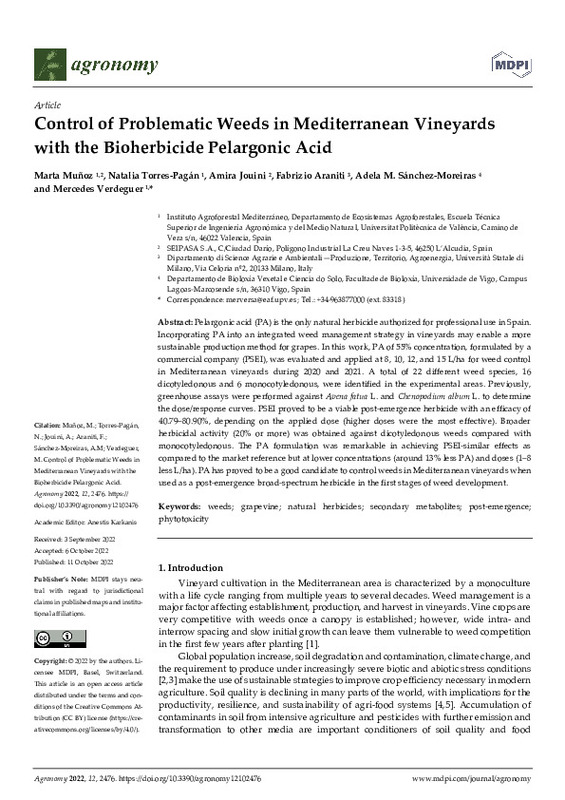JavaScript is disabled for your browser. Some features of this site may not work without it.
Buscar en RiuNet
Listar
Mi cuenta
Estadísticas
Ayuda RiuNet
Admin. UPV
Control of Problematic Weeds in Mediterranean Vineyards with the Bioherbicide Pelargonic Acid
Mostrar el registro sencillo del ítem
Ficheros en el ítem
| dc.contributor.author | Muñoz, Marta
|
es_ES |
| dc.contributor.author | Torres-Pagán, Natalia
|
es_ES |
| dc.contributor.author | Jouini, Amira
|
es_ES |
| dc.contributor.author | Araniti, Fabrizio
|
es_ES |
| dc.contributor.author | Sánchez-Moreiras, Adela M.
|
es_ES |
| dc.contributor.author | Verdeguer Sancho, Mercedes María
|
es_ES |
| dc.date.accessioned | 2023-05-24T18:02:08Z | |
| dc.date.available | 2023-05-24T18:02:08Z | |
| dc.date.issued | 2022-10 | es_ES |
| dc.identifier.uri | http://hdl.handle.net/10251/193576 | |
| dc.description.abstract | [EN] Pelargonic acid (PA) is the only natural herbicide authorized for professional use in Spain. Incorporating PA into an integrated weed management strategy in vineyards may enable a more sustainable production method for grapes. In this work, PA of 55% concentration, formulated by a commercial company (PSEI), was evaluated and applied at 8, 10, 12, and 15 L/ha for weed control in Mediterranean vineyards during 2020 and 2021. A total of 22 different weed species, 16 dicotyledonous and 6 monocotyledonous, were identified in the experimental areas. Previously, greenhouse assays were performed against Avena fatua L. and Chenopodium album L. to determine the dose/response curves. PSEI proved to be a viable post-emergence herbicide with an efficacy of 40.79¿80.90%, depending on the applied dose (higher doses were the most effective). Broader herbicidal activity (20% or more) was obtained against dicotyledonous weeds compared with monocotyledonous. The PA formulation was remarkable in achieving PSEI-similar effects as compared to the market reference but at lower concentrations (around 13% less PA) and doses (1¿8 less L/ha). PA has proved to be a good candidate to control weeds in Mediterranean vineyards when used as a post-emergence broad-spectrum herbicide in the first stages of weed development. | es_ES |
| dc.description.sponsorship | This research was funded by SEIPASA. | es_ES |
| dc.language | Inglés | es_ES |
| dc.publisher | MDPI | es_ES |
| dc.relation.ispartof | Agronomy | es_ES |
| dc.rights | Reconocimiento (by) | es_ES |
| dc.subject | Weeds | es_ES |
| dc.subject | Grapevine | es_ES |
| dc.subject | Natural herbicides | es_ES |
| dc.subject | Secondary metabolites | es_ES |
| dc.subject | Post-emergence | es_ES |
| dc.subject | Phytotoxicity | es_ES |
| dc.subject.classification | BOTANICA | es_ES |
| dc.title | Control of Problematic Weeds in Mediterranean Vineyards with the Bioherbicide Pelargonic Acid | es_ES |
| dc.type | Artículo | es_ES |
| dc.identifier.doi | 10.3390/agronomy12102476 | es_ES |
| dc.rights.accessRights | Abierto | es_ES |
| dc.contributor.affiliation | Universitat Politècnica de València. Escuela Técnica Superior de Ingeniería Agronómica y del Medio Natural - Escola Tècnica Superior d'Enginyeria Agronòmica i del Medi Natural | es_ES |
| dc.description.bibliographicCitation | Muñoz, M.; Torres-Pagán, N.; Jouini, A.; Araniti, F.; Sánchez-Moreiras, AM.; Verdeguer Sancho, MM. (2022). Control of Problematic Weeds in Mediterranean Vineyards with the Bioherbicide Pelargonic Acid. Agronomy. 12(10):1-18. https://doi.org/10.3390/agronomy12102476 | es_ES |
| dc.description.accrualMethod | S | es_ES |
| dc.relation.publisherversion | https://doi.org/10.3390/agronomy12102476 | es_ES |
| dc.description.upvformatpinicio | 1 | es_ES |
| dc.description.upvformatpfin | 18 | es_ES |
| dc.type.version | info:eu-repo/semantics/publishedVersion | es_ES |
| dc.description.volume | 12 | es_ES |
| dc.description.issue | 10 | es_ES |
| dc.identifier.eissn | 2073-4395 | es_ES |
| dc.relation.pasarela | S\474411 | es_ES |
| dc.subject.ods | 02.- Poner fin al hambre, conseguir la seguridad alimentaria y una mejor nutrición, y promover la agricultura sostenible | es_ES |
| dc.subject.ods | 09.- Desarrollar infraestructuras resilientes, promover la industrialización inclusiva y sostenible, y fomentar la innovación | es_ES |
| dc.subject.ods | 13.- Tomar medidas urgentes para combatir el cambio climático y sus efectos | es_ES |
| dc.subject.ods | 15.- Proteger, restaurar y promover la utilización sostenible de los ecosistemas terrestres, gestionar de manera sostenible los bosques, combatir la desertificación y detener y revertir la degradación de la tierra, y frenar la pérdida de diversidad biológica | es_ES |








